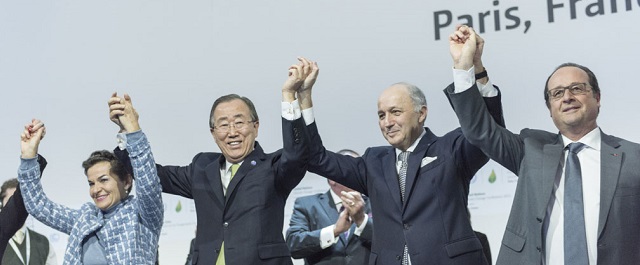Africa drives bold new narrative at COP21, asserts post-COP period will be key

Paris, France, 12 December 2015 – As the world celebrates the outcome of the COP21 climate negotiations, widely touted as an historic deal to transform the world's carbon economy and slow the rate of global warming, implementation of the new climate deal will be vital for Africa, says Fatima Denton, Director of the Special Initiatives Division and Coordinator of the African Climate Policy Centre (ACPC) at the UN Economic Commission for Africa (UNECA).
Speaking in the aftermath of the landmark Paris conference, Ms. Denton commended Africa’s positive and tireless commitment throughout the entire negotiation process, successfully demonstrating its weight in the global climate negotiating arena.
“The significance of this COP was clear; this was the frontier COP, the COP of humanity. If an ambitious agreement was not achieved in Paris, the opportunity would have been missed.
“Africa came to these negotiations with determination and commitment, indicating that it is far more than just an observer. We reminded the world that as fifty-four countries, Africa is a considerable force – and, without the buy-in of these countries, there would have been no global agreement. At COP21, Africa laid out a clear set of issues and left the conference with a real sense of satisfaction, having put these issues firmly on the table.”
However, according to Ms. Denton, the signing of the long-awaited climate deal remains only a step in the right direction – for Africa, the real challenge lies in implementation of the agreement in the post-COP period ahead.
“Many of the issues the continent brought to COP21 will not be resolved overnight. Much work remains to be done in terms of putting our ambitions and development objectives into practice – a big part of this will be seeing how we can finance these plans.”
Yet according to Denton, clear Intended Nationally Determined Contributions (INDC), setting out how African nations will tackle climate change – both in terms of reducing carbon emissions and in adapting to climate challenges – will serve the continent well as it pushes ahead with implementation.
“Africa’s INDCs, including specific proposals on how it intends to reduce greenhouse gas emissions, were the most ambitious of all. These proposals run alongside concrete plans of how the continent intends to drive forward its economy with the development of sectors such as energy, forestry and agriculture. With clear climate action plans that are carefully aligned with national development strategies, Africa has done much valuable work in charting the pathway going forward.”
Ms. Denton continued that submitting these ambitious national plans of action have contributed to a bold new narrative for the continent, emerging from the Paris negotiations. These plans, combined with the launch of two dynamic pan-African initiatives - the African Initiative on Adaptation and Loss and Damage, and the African Renewable Energy Initiative - have cemented the continent’s place as a front-runner in a new decarbonised world, and a thought-leader in developing innovative climate solutions.
“In Africa’s INDCs and the launch of these two initiatives, Africa set out some very clear and tangible proposals. With this, we have seen a clear shift in narrative, moving away from an old dialogue which saw Africa “asking” – be that for financial support or new technologies.
“With its own ambitious plans, Africa has demonstrated that it will not passively wait for things to happen. Instead, it has embraced a new determination and unity, showing the world that it is in control of its own development – and its own destiny,” Denton concluded.
Keyword:
- Log in to post comments


